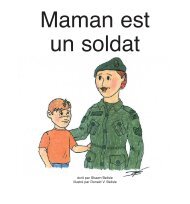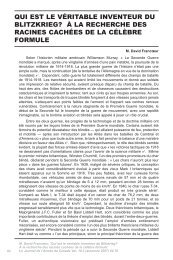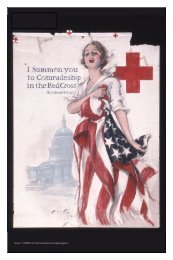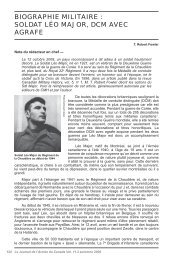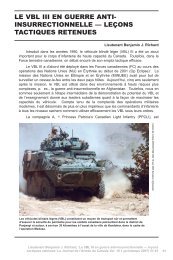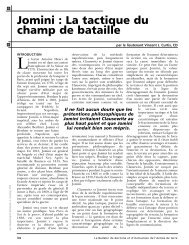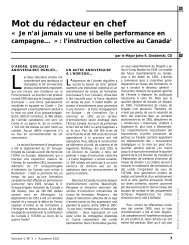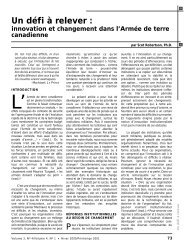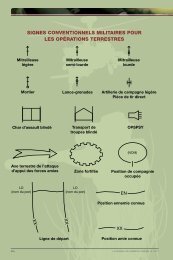The Canadian Army Journal
The Canadian Army Journal
The Canadian Army Journal
You also want an ePaper? Increase the reach of your titles
YUMPU automatically turns print PDFs into web optimized ePapers that Google loves.
106<br />
way with the use of his scoped Lee-Enfield. During the barrage, one of the men went<br />
down outside the house and De Lutis broke cover while German shells softened the area<br />
up for their attack. Wounded by splinters from a mortar shell, De Lutis showed no signs<br />
of letting down and reached the wounded man in good time, dragging him to the relative<br />
safety of the farmhouse where he resumed the direction of its defence yet again. 62<br />
Without his courage, leadership, and coolness under fire, the men in the farmhouse<br />
would likely have succumbed to the weight of German attacks, and a result, De Lutis was<br />
granted an immediate Military Medal. 63<br />
In the town itself, it was dawning on<br />
Major Ed Pinkham that his notorious<br />
good luck was indeed running out and<br />
he informed Mitchell that the Germans<br />
occupied barns to the north and the<br />
west and could use any empty building<br />
surrounding Spycker at will. If,<br />
Pinkham argued, reinforcements were<br />
made available immediately to occupy<br />
these structures this could be<br />
prevented, but as current strength was<br />
lacking he concluded that his position<br />
was untenable. 64 With the flooded<br />
conditions only a force of sufficient size<br />
could accomplish this objective and<br />
Pinkham wisely concluded that “it was wasteful” at present to engage in a battle of<br />
attrition with “little gain on our side.” 65 With the western road still closed, the armoured<br />
cars ineffective in the tight streets, and the necessity of maintaining a firm base at<br />
Grande Mille Brugge a going concern, Mitchell could not spare his remaining rifle or<br />
support companies. Under the circumstances, Mitchell proposed to withdraw from the<br />
town and informed Megill, who in turn tasked the Regiment de Maisonneuve to take over<br />
the Black Watch positions. 66 Although the pieces were available at Brigade for the<br />
evacuation, no plan was in place. As mid-afternoon approached, Mitchell requested<br />
ambulance Jeeps be sent up “immediately” but it took time for Brigade to comply; and<br />
there is no indication that any were dispatched at this time. Demonstrably annoyed at<br />
the lack of immediate action at Brigade headquarters, he signalled forty minutes later<br />
that the “situation was not good” and demanded to know “…when can we expect the new<br />
plan?” 67 <strong>The</strong> delay at Brigade stemmed from the fact that both Brigadier Megill and his<br />
de facto deputy from the 5th Field Regiment, Lt. Col Nighswander, were away from<br />
headquarters visiting other battalions taking part in “Blinder” and nobody could make a<br />
decision either way in the absence. 68 Brigade attempted to re-assure Mitchell, however,<br />
that Megill knew of the problem and that upon his return “shortly,” he would “get (a) plan<br />
up as soon as possible.” This news, however, was little comfort for those still trapped in<br />
Spycker. 69<br />
As daylight faded into night, flames from burning structures in and around the town<br />
illuminated the landscape, but still there was no plan. Sporadic fighting continued in the<br />
town, although it was clear by this time that the Germans were just as exhausted as the<br />
Black Watch; a lull in the fighting right across the front held for the most part with the<br />
exception of quick retort from automatic weapons or the strafing of Mitchell’s<br />
headquarters in the brick plant by Spitfires. 70 Nixon and two local inhabitants of Spycker June 2007<br />
Finally, late in the evening, Brigade had its<br />
plan worked out and Phase One of the relief of the Black Watch by the Regiment de<br />
Maisonneuve commenced at 03:00—33 hours after the initial assault went in.<br />
It took just over five hours to complete the evacuation; men from A Company<br />
escorted Jeep ambulances and stretcher-bearers on foot along the same route used by<br />
C Company two days earlier. This required stealthy precision to avoid alerting the<br />
<strong>Canadian</strong> <strong>Army</strong> <strong>Journal</strong> Vol. 11.1 Spring 2008<br />
Courtesy of Author


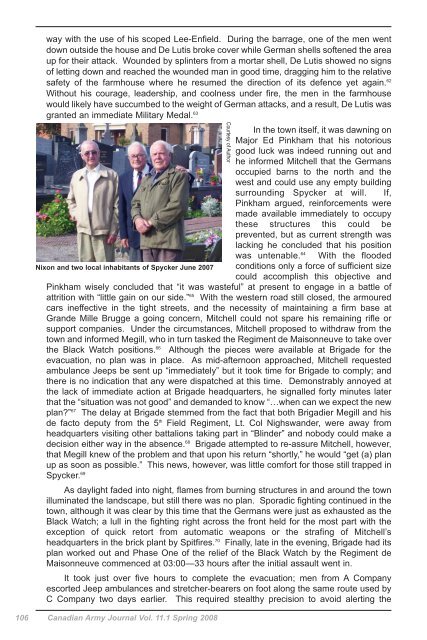
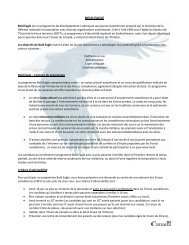
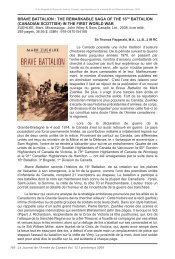
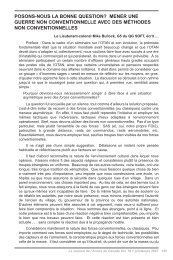
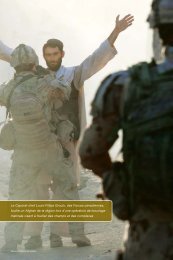
![La modularite dans l'Armee de terre canadienne [pdf 1.6 MB]](https://img.yumpu.com/17197737/1/188x260/la-modularite-dans-larmee-de-terre-canadienne-pdf-16-mb.jpg?quality=85)

